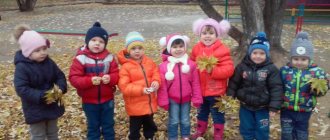FEATURES OF THE ORGANIZATION OF THE EDUCATIONAL PROCESS IN DOST article on the topic
This paper examines how the educational process is carried out in a preschool educational institution, its models and planning of the educational process in accordance with the Federal State Educational Standard for Preschool Education.
Preschool education is a holistic process aimed at: ensuring the versatile development of a preschool child in accordance with his inclinations, inclinations, abilities, individual, mental and physical characteristics, and cultural needs; the formation of moral standards in a preschool child, his acquisition of life social experience.
The introduction of the Federal State Educational Standard is due to the fact that there is a need to standardize the content of preschool education in order to provide every child with an equal starting opportunity for successful schooling.
The specificity of preschool age is such that the achievements of preschool children are determined not by the sum of specific knowledge, abilities and skills, but by the totality of personal qualities that ensure the child’s psychological readiness for school.
We consider the educational process today as a systemic, holistic one, developing over time and within a certain system, a purposeful process of interaction between adults and children, which is personality-oriented in nature, aimed at achieving socially significant results, designed to lead to the transformation of the personal properties and qualities of students. The educational process provides each individual with the opportunity to satisfy their development needs, develop their potential abilities, preserve their individuality, and the opportunity to self-realize.
The teacher’s task is to plan the educational process in such a way that, together with the student, they can fully experience all its stages: preparation, conduct, discussion of the results. At the same time, it is important that the child has positive emotional experiences and memories. At the same time, in joint activities with the teacher, the student takes a step forward in his development.
The main feature of the organization of the educational process in preschool educational institutions at the present stage is the departure from educational activities, increasing the status of play as the main activity of preschool children; inclusion in the process of effective forms of work with children: ICT, project activities, gaming, problem-based learning situations as part of the integration of educational areas.
Features of the implementation of the educational process in accordance with the requirements of the Federal State Educational Standard for Education
From September 1, 2015, the federal state educational standard for preschool education was introduced as usual in all preschool educational institutions of this type.
In 2014, our institution took part in the regional experiment (it is in front of you) “Approbation of the Federal State Educational Standard of Preschool Education as a mechanism for ensuring the quality and development of variability in the system of preschool education services in educational institutions of the Leningrad Region” as a pilot site.
And today we would like to share our experience in implementing the educational process in accordance with the requirements of the Federal State Educational Standard for Education in our institution.
We consider the educational process today as a systemic, holistic one, developing over time and within a certain system, a purposeful process of interaction between adults and children, which is personality-oriented in nature, aimed at achieving socially significant results, designed to lead to the transformation of personal properties and qualities pupils.
What has changed in the implementation of the educational process in connection with the introduction of the Federal State Educational Standard for Education?
1. I would like to start with Planning.
Planning is the organization of the pedagogical process of a preschool educational institution, which gives it content, certainty, and controllability. We clearly understand that the effectiveness of educational work as a whole depends on the quality of the teacher’s planning of work with children.
Our work practice shows that the most effective way to work with preschool children is complex thematic planning. This approach imparts systematicity and consistency in the implementation of program tasks; a situation is created when the child’s all senses are involved, and, therefore, the material is better absorbed.
In accordance with the complex thematic principle of constructing the educational process, we offer the child not a set of individual game techniques to motivate educational activities, but the assimilation of educational material in the process of preparing and conducting any events that are significant and interesting for preschoolers. Thus, the TRADITIONAL PRINCIPLE OF ORGANIZING THE CONTENT OF EDUCATION CHANGES FROM “SUBJECT” TO “MEANING” / “EVENT”. And for us, the criterion that this principle has worked is the lively, active, interested participation of the child in one or another project activity, and not a chain of actions as directed by an adult.
2. The ways of organizing children's activities have changed.
The position of the participants in educational relations has changed: “NOT THE GUIDANCE OF AN ADULT,” BUT “JOINT (PARTNER) ACTIVITY OF AN ADULT AND A CHILD.”
If earlier the teacher had to be in charge: to lead and manage the child, now the child and the adult are both subjects of interaction, equal in importance. And today, a teacher needs to have in his “arsenal” many pedagogical practices in order to be interesting to a child and arouse a desire to interact with him.
If earlier the activity of an adult (including speech activity, when an adult speaks “a lot”) was higher than the activity of a child, now the child’s activity should be at least no less than the activity of an adult. But for this, the teacher himself must be competent in speech, speech formulas and speech motivators in order to encourage children’s activity.
THE TRADITIONAL PRINCIPLE OF “ACTIVE ADULT” IS CHANGED TO “BOTH ADULT AND CHILD ARE ACTIVE AS PARTICIPANTS IN JOINT ACTIVITIES.”
2. Of course, it is impossible to underestimate the role of pedagogical diagnostics (monitoring) of a child’s individual development in the success of the educational process. After all, it is monitoring data that allows us to adjust and guide this process.
To date, no methodological recommendations have been published for conducting pedagogical monitoring under the program “From birth to school” for all ages. However, an assessment of children’s individual development can be carried out by a teacher during internal monitoring of the formation of the main (key) characteristics of the child’s personality development. We carry out this assessment through regular observations of children in their daily lives. This assessment allows us to identify children who need special attention from the teacher. And, importantly, to identify a general psychological and pedagogical assessment of the success of the educational and educational influences of group teachers at different stages of the educational process.
I WOULD LIKE TO PAY ATTENTION THAT IT IS NECESSARY TO REFUSE THE TRADITIONAL PRINCIPLE OF ORIENTATION ON THE “AVERAGE” CHILD AND GO TO A “PERSONAL” ORIENTATION THAT TAKES ACCOUNT THE INDIVIDUAL CHARACTERISTICS OF EACH CHILD.”
3. The concept of “occupation” has changed.
The text of the Federal State Educational Standard does not use the word “occupation,” but this does not mean a transition to the position of “free education” of preschoolers. The learning process remains.
In our practice, we consider the concept of “activity” as an entertaining activity without identifying it with occupation as a didactic form of educational activity. The activity should be a specific children's activity that is interesting for children, specially organized by the teacher, implying their activity, business interaction and communication, and the accumulation of certain information about the world around them.
THUS, THE MAIN ACTIVITY FOR US BECOMES NOT EDUCATIONAL, BUT SPECIFIC TYPES OF CHILDREN'S ACTIVITIES.
4. Today, the mandatory participation of children in various activities has changed. If previously they had no choice and each child was obliged to “study in class,” today we try to ensure that the child has the opportunity to participate in joint activities with an adult or do something else. Moreover, today the developing subject-spatial environment created in groups helps us act in this way.
But it must be remembered that every child should receive the same starting opportunities for school! And accordingly, it is DESIRABLE that he take part in the planned activities. Therefore, today's teacher needs professional knowledge of speech motivation methods and technologies for modeling educational situations, taking into account the requirements of the Federal State Educational Standard for Educational Education in order to skillfully involve a child in one or another type of activity.
IT IS NECESSARY TO REVIEW THE TRADITIONAL MOTIVES FOR CHILDREN’S PARTICIPATION IN EDUCATIONAL ACTIVITIES AND TO GO FROM “AUTHORITY OF AN ADULT” TO “INTEREST AND SURPRISE OF THE CHILD.”
5. Well, the main feature: The game is at the forefront.
The fact that the role of play as a leading activity of a preschooler is increasing and it is given a leading place is POSITIVE, since in recent years, due to social changes in society, informatization, as well as the intensive preparation of the child for school, play is disappearing from the world of childhood.
Today, preschool education is designed to bring back cognitive, exploratory, creative play to childhood, in which the child learns to communicate and interact, with the help of which he learns about the world, the relationships of objects and people in this world.
Thus, I would like to highlight the main feature of the organization of educational activities in preschool educational institutions at the present stage - THIS IS A CAUTION FROM LEARNING ACTIVITIES, INCREASING THE STATUS OF GAMES AS THE MAIN TYPE OF ACTIVITY FOR PRESCHOOL CHILDREN.
6. And of course, it is impossible to talk about organizing a full-fledged educational process in accordance with the Federal State Educational Standard for Education without the active participation of parents: parents must participate in the implementation of the program, must be active participants in the educational process, and not just outside observers.
And here I see the role of the teacher in ensuring the involvement of families directly in educational activities, including through the creation of educational projects together with the family based on identifying needs and supporting the educational initiatives of the family. TODAY WE HAVE REVISED THE TRADITIONAL MOTIVES FOR PARENTS' PARTICIPATION IN EDUCATIONAL ACTIVITIES AND HAVE GOED FROM “PARENT IS AN OBSERVER” TO “PARENT IS AN ACTIVE PARTICIPANT.”
Concluding my speech, I would like to note that the introduction of the Federal State Educational Standard is due to the fact that there is a need to standardize the content of preschool education in order to provide every child with an equal starting opportunity for successful learning at school.
The specificity of preschool age is such that the achievements of preschool children are determined not by the sum of specific knowledge, abilities and skills, but by the totality of personal qualities that ensure the child’s psychological readiness for school.
Those. Teaching reading and arithmetic is not the goal of preschool education. A preschool institution is designed to help a child painlessly move to a new level of education, develop the child emotionally, communicatively, physically and mentally, and develop abilities and desire to study at school.
And this depends on who works with children – you and me! So let's all help our children become successful in life! Have a great school year everyone!
The essence of the pedagogical process in a preschool educational institution
The pedagogical process in a preschool educational institution (DOU) is an interaction between educators and students that is specially organized within a specific preschool educational institution and develops over time, aimed at achieving the set educational goals.
The essence of the pedagogical process in a preschool educational institution is that it is aimed at developing the holistic nature of a preschool child, his originality and uniqueness.
Are you an expert in this subject area? We invite you to become the author of the Directory Working Conditions
Forms of organizing the pedagogical process in preschool educational institutions: upbringing, training, development, education.
The pedagogical process of a preschool educational institution, as a system, is characterized by integrity, structure, plurality and openness.
One of the main units that make up the pedagogical process is competence.
Definition 2
Competence is the ability to solve a variety of professional problems.
The pedagogical process in a preschool educational institution includes the following groups of competencies that a teacher must have:
- Key competencies:
- social – represents the ability to establish contact with various groups of society;
multicultural – the ability to interact with other cultures and ethnic groups;
- informational – the ability to independently master new ways of searching and obtaining the necessary information;
- subject-based activity – the ability to solve various problems included within individual academic subjects.
- Basic competencies – the ability of a teacher to solve typical problems for a specific professional activity:
- the ability to understand and accept the child as he is;
independently design and implement the pedagogical process;
- establish relationships with all subjects of the pedagogical process;
- organizing an environment that allows you to effectively solve educational problems;
- systematic self-improvement, self-education, increasing professional competence and pedagogical culture.
- Special competencies are the ability of a teacher to solve specific professional problems.
Finished works on a similar topic
Course work Pedagogical process in a preschool educational institution 410 ₽ Abstract Pedagogical process in a preschool educational institution 220 ₽ Test work Pedagogical process in a preschool educational institution 240 ₽
Receive completed work or specialist advice on your educational project Find out the cost


